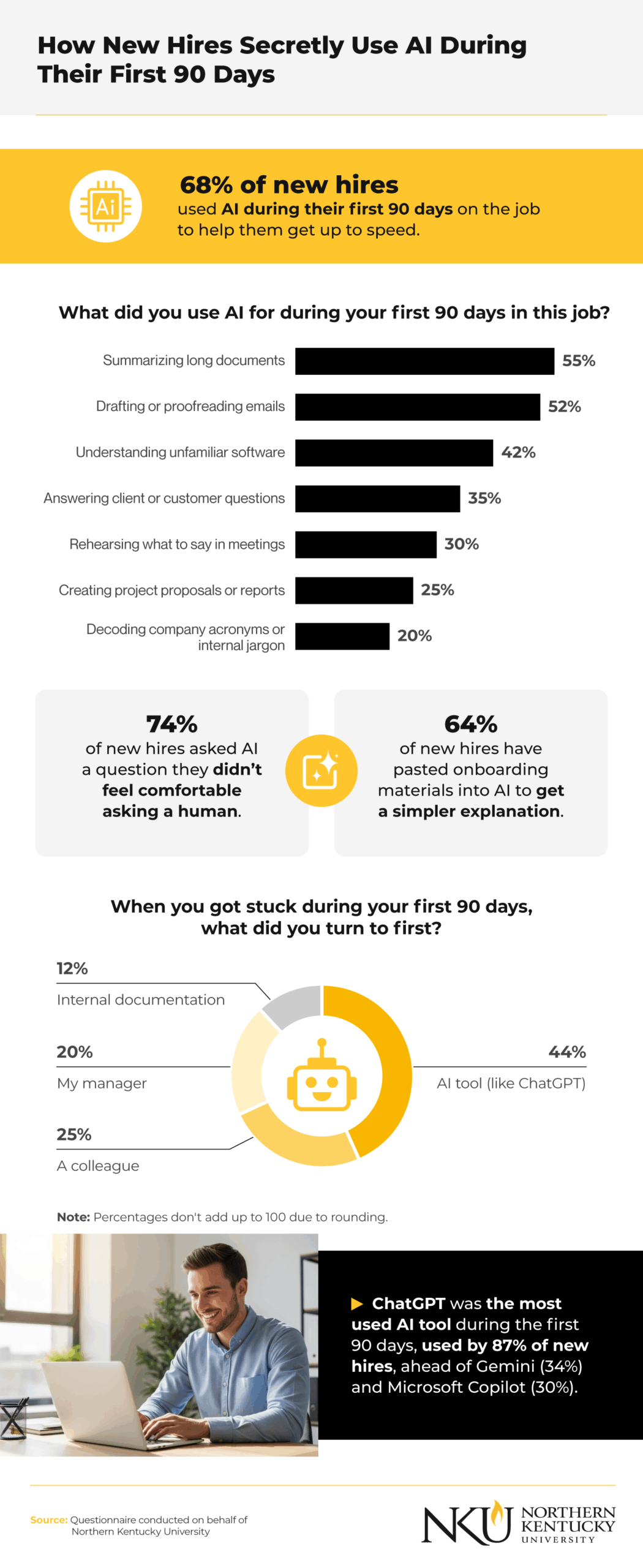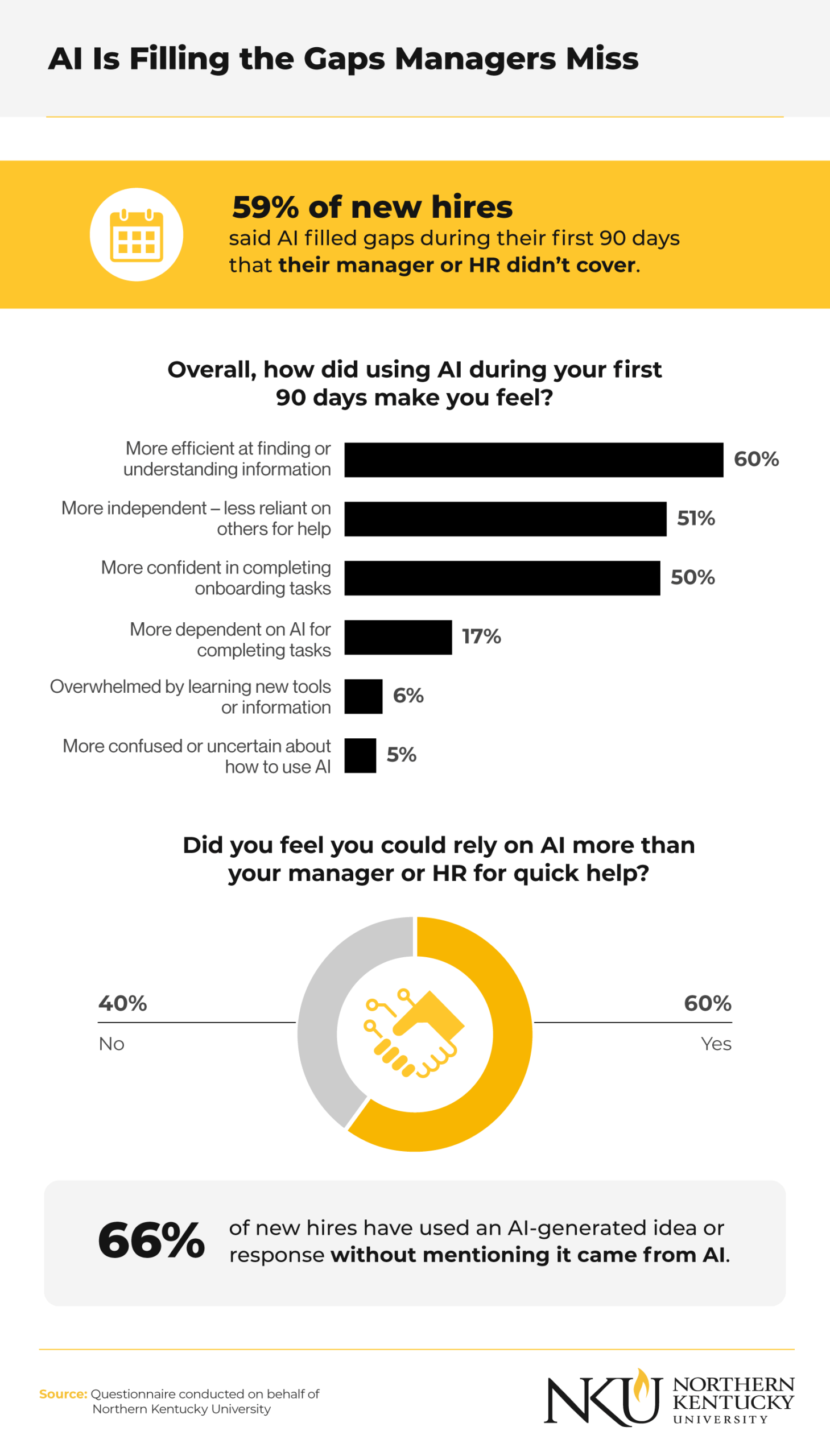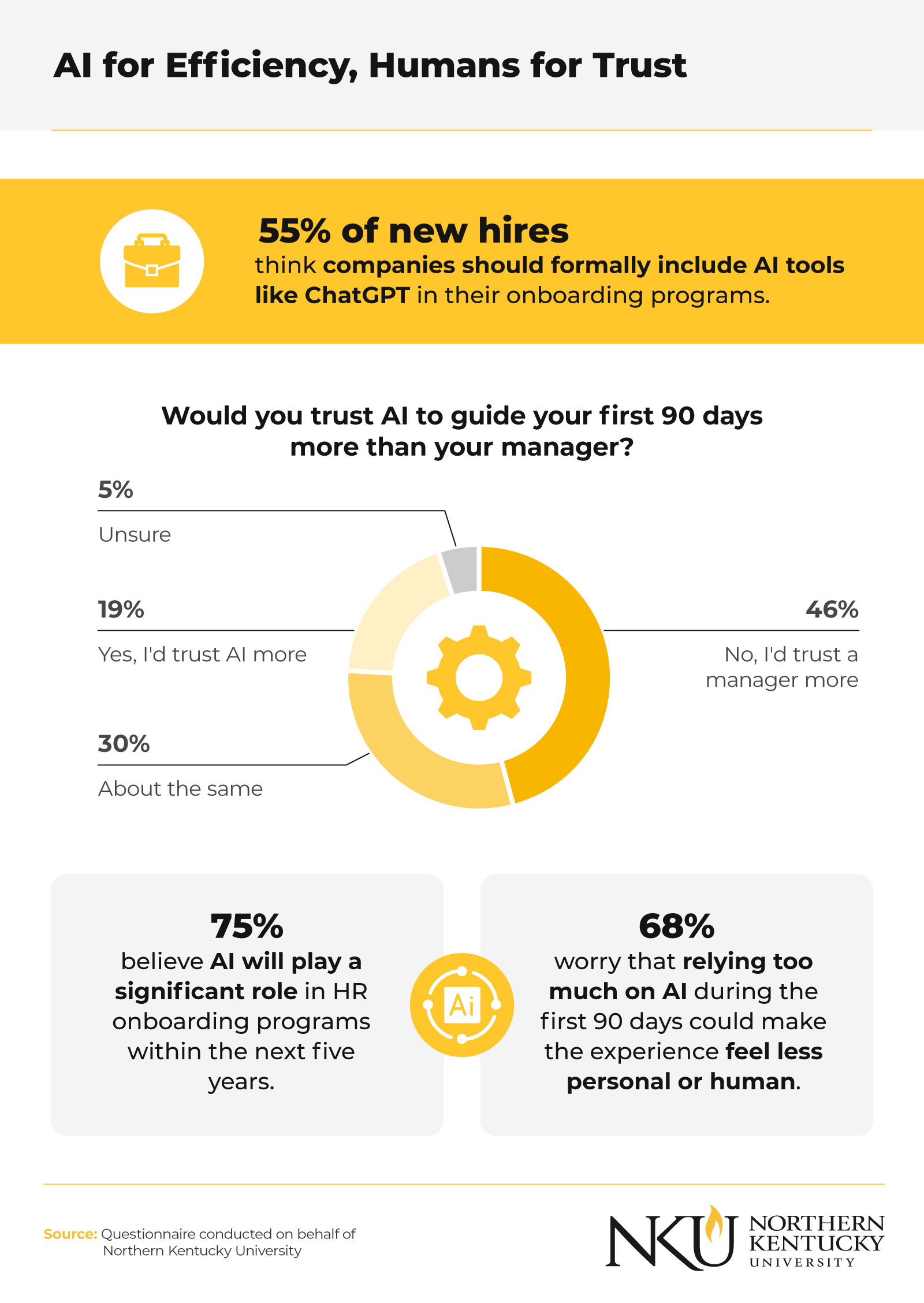
The first 90 days in a new role have always been critical for long-term success, but for today’s workforce, this onboarding period is being reshaped by technology — specifically, artificial intelligence (AI). As more professionals begin their jobs in hybrid or remote settings, many are turning to tools like ChatGPT to learn faster, ask questions they might hesitate to voice aloud and close knowledge gaps left by traditional onboarding processes.
To better understand this shift, a nationwide questionnaire of 1,000 Americans who started new jobs within the past year was conducted on behalf of Northern Kentucky University (NKU). The findings reveal that AI is quietly transforming how employees navigate their first three months, especially when it comes to training, communication and building confidence on the job.
Key Takeaways
- 68% of new hires used AI during their first 90 days on the job to help them get up to speed.
- 44% of new hires turned to AI first when they got stuck, more than those who asked a colleague (25%) or their manager (20%).
- 60% of new hires felt they could rely on AI more than their manager or HR for quick help.
- 66% of new hires used an AI-generated idea or response without disclosing that it originated from AI.
- 75% of new hires believe AI will play a significant role in HR onboarding programs within the next five years.
- 46% of new hires say they’d still trust a manager more than AI to guide their first 90 days, but 49% would trust AI as much or more.
Why New Hires Turn to AI Before Their Manager
New employees often feel pressure to perform quickly, and many now find AI tools more approachable than asking for help in person. As onboarding becomes increasingly digital, these platforms provide instant answers without the anxiety of judgment or delay.

More than two-thirds of new hires (68%) used AI during their first 90 days to get up to speed. This reliance was even higher among hybrid workers (78%), who balance both digital and in-person environments, compared to 67% of fully remote and 60% of onsite employees. The findings suggest that hybrid workers have become especially adept at blending AI support into their learning process.
Generational trends add another layer of insight. While 72% of Gen X and 68% of millennials reported using AI, only 62% of Gen Z did the same. Interestingly, Gen Z was the most likely to use AI to practice what to say in meetings (36%) and to decode company jargon or acronyms (23%).
When facing a challenge, 44% of all new hires turned to AI before seeking help from a colleague (25%) or manager (20%). Even among fully onsite workers surrounded by potential mentors, 41% initially turned to AI. This pattern indicates that the preference for digital problem-solving extends beyond the work environment and reflects a growing comfort with AI as a trusted first point of support.
AI Builds Confidence
AI is quickly becoming more than a productivity aid. By offering quick, judgment-free feedback, AI helps new employees feel self-sufficient during a period that can otherwise be uncertain and overwhelming.

Sixty percent of new hires reported relying on AI more than their manager or HR for quick assistance. This sentiment was strongest among hybrid workers (64%), followed by onsite employees (60%) and remote employees (53%).
Nearly half of the respondents reported that their managers didn’t know they were using AI during their onboarding. This underscores how integrated and invisible these tools have become in daily workflows.
Furthermore, 66% admitted to using an AI-generated idea or response without disclosing its source. Whether editing an email or drafting a report, AI is shaping how new hires communicate and work, even if it remains behind the scenes.
AI Makes Work Faster, but Managers Still Matter
While new hires increasingly depend on AI, they still value human guidance. The future of onboarding likely lies in balance, combining AI-driven learning with mentorship from experienced managers.

More than two-thirds of respondents (67%) agreed that AI made their first 90 days more efficient, helping them locate information quickly and complete tasks faster. Over half (57%) said companies should provide onboarding materials about how to use AI responsibly, including sample prompts, policies and best practices.
Looking ahead, 75% of new hires said they believe AI will play a major role in HR programs within the next five years. Yet, despite AI’s growing role, trust in human leadership remains vital. While 46% still trusted their manager more than AI to guide their first 90 days, 49% said they trust AI just as much or even more. This balance suggests that employees see value in both, relying on AI for speed and managers for connection and context.
The New Onboarding Reality: Human Connection Meets AI Assistance
AI is redefining what it means to be new in the workplace. For many, these tools are not replacing traditional onboarding, but they’re filling its gaps, offering on-demand knowledge and reassurance. As NKU’s findings reveal, the first 90 days are now a blend of human and digital learning, where success depends on understanding how to use both wisely.
Methodology
A questionnaire was conducted on behalf of Northern Kentucky University among 1,000 Americans who had recently started new roles within the past 12 months. The study examined how new hires utilized AI tools during their first 90 days to accelerate learning, complete tasks more efficiently and bridge training gaps.
Respondents represented fully onsite (45%), fully remote (24%) and hybrid (32%) environments across generational groups: Gen Z (24%), millennials (52%), Gen X (22%) and baby boomers (3%). Data was collected in October 2025. This is a non-scientific, exploratory study and is not intended to represent all U.S. new hires.
About Northern Kentucky University
Northern Kentucky University offers flexible, affordable programs designed for working adults ready to advance their careers through real-world learning. NKU’s online Master of Business Administration (MBA) program helps students strengthen their leadership, analytical and strategic thinking skills, all valuable tools for professionals navigating today’s AI-driven workplace.
Fair Use Statement
Information from this article may be shared for noncommercial purposes only. If you reference or republish any content, please include proper attribution and a link back to Northern Kentucky University.